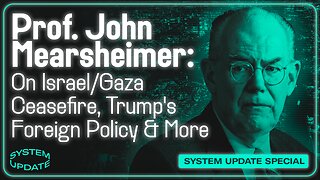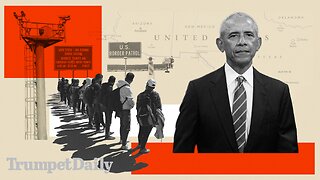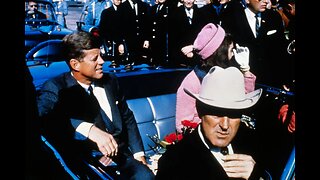Premium Only Content

Part 4 Christian Nationalism is Holy Ghost Pentecostal Unity
John Wycliffe: The Bible is The Government of the People.
Christianity in its true sincere practice has always been suppressed by Tyrants throughout History. Kings, Popes, Regimes silence, persecute, deem their speech as dangers, because Christianity points out faults, corruption, tyranny. They are not God and can not rule other men. Men must serve Almighty God Only and not mere man/men.
Week 4 Teaching Series Part 4 Christian Nationalism is Holy Ghost Pentecostal Unity
The Founding Fathers Were Christian Nationalists- Understanding the Historical Background of America's
https://resistancechicks.blogspot.com/2022/10/the-founding-fathers-were-christian.html
The Founding Fathers Were Christian Nationalists- Understanding the Historical Background of America's
With these principles we have taken on our local government when our township and county tried to tell us we could not farm on our own property. Another major battlefront for patriots is the food freedom movement and Michelle and I are on the frontlines fighting that fight.
Those who come to our room will learn strategies that will enable them to tackle local, state, and federal regulations that wish to keep them bound to Big Ag other tyrannical government agencies like the FDA, CDC and USDA. Food Freedom is medical freedom.
Let food be thy medicine and medicine be thy food.
America is a Christian nation whose foundation is solely and completely based upon men and women living out the Word of God. The Bible was the most quoted book by the founding fathers but in the early 1900's secularists hijacked the American school system, with the express goal of rewriting American history to take all mention of God and His Divine hand of Providence out of the curriculum. Because 80% of Christians send their children to public schools we are woefully undereducated and lose many court cases because we do not know how to stand on the same principles that guided the great minds that created this nation's founding documents.
The Movarian Church: John Hus (Jan Hus) https://www2.kenyon.edu/projects/margin/hus.htm
John Hus at the Council of Constance
JOHN HUS (Jan Hus) was born sometime around 1372 in the town of Husinec, Bohemia, in the area that is now the Czech Republic. He studied theology at the University of Prague; after his ordination as a priest (1402), he became preacher at the Bethlehem Chapel in Prague. Services at the Bethlehem Chapel were conducted in Czech, contrary to the common practice of conducting services in Latin. The Bible was read and sermons were preached in the common language. Hus was intrigued by the writings of the early English reformer John Wycliffe, though he did not agree with all Wycliffe's teachings. Hus preached actively against the worst abuses of the Roman Church of the day. His primary teachings were:
- Hus called for a higher level of morality among the priesthood. Financial abuses, sexual immorality, and drunkenness were common among the priests of Europe.
- Hus called for preaching and Bible reading in the common language, and for all Christians to receive full communion. At the time, laypersons received only the bread during communion, and only priests were allowed to receive the wine.
- Hus opposed the sale of indulgences. These were documents of personal forgiveness from the Pope which were sold for sometimes exorbitant prices to raise funds for Crusades.
- Hus opposed the relatively new doctrine of Papal infallibility when Papal decrees contradicted the Bible. He asserted the primacy of the Scriptures over church leaders and councils.
Hus lived at a time of tumultuous division in the Western Church known as the Great Schism. There were for a time two, and briefly even three competing Popes who each claimed complete authority over the Church. Hus's criticisms and calls for reforms came in the midst of the Schism; high Church leaders generally regarded Hus as an irritating stumbling block to reconciling the divided Church and he was excommunicated. Assured safe conduct by Sigismund, the Holy Roman Emperor, Hus journeyed to the Council of Constance (1414-1418) to defend his beliefs. The Council of Constance was the Council which finally ended the Schism with the election of Pope Martin V. Despite the Emperor's guarantee of safe conduct for Hus, he was immediately imprisoned. When finally tried, he was accused of the crime of being a Wycliffite. He was not allowed to defend himself or his beliefs. Because of his refusal to recant, Hus was declared an heretic and was burned at the stake on July 6, 1415.
Watch “Headline News: The Resistance Chicks” Live on Brighteon.tv every Friday from 6:00
-
 3:08:55
3:08:55
Resistance Chicks
4 days ago $0.94 earnedLIVE Inauguration Day 2025 Coverage with Resistance Chicks
2.24K2 -
 LIVE
LIVE
Glenn Greenwald
2 hours agoProf. John Mearsheimer on Israel/Gaza Ceasefire, Trump's Foreign Policy, Ukraine, Free Speech Crackdowns & More | SYSTEM UPDATE #396
4,333 watching -
 LIVE
LIVE
Nerdrotic
4 hours ago $14.94 earnedHollywood LOST the Culture War! Star Trek Section 31, Disney Lies! | Friday Night Tights #338 w RMB
9,201 watching -
 1:00:03
1:00:03
Candace Show Podcast
5 hours agoWOAH! Daily Wire CEO Shares HARSH Feelings About Brett Cooper | Candace Ep 138
109K152 -
 LIVE
LIVE
Edge of Wonder
3 hours agoStrange Egg UFO Found in Antarctica: Real or AI Images?
401 watching -
 LIVE
LIVE
Dr Disrespect
9 hours ago🔴LIVE - DR DISRESPECT - TRIPLE THREAT CHALLENGE - NOBODY STOPS US
1,829 watching -
 54:59
54:59
LFA TV
8 hours agoWhy Do Migrant Criminals Love Obama So Much? | TRUMPET DAILY 1.24.25 7pm
4.02K4 -
 LIVE
LIVE
2 MIKES LIVE
2 hours ago2 MIKES LIVE #171 Open Mike Friday!
429 watching -
 LIVE
LIVE
Quite Frankly
7 hours ago"Fugitives No More, JFK Declass, Stargate vs MAHA" ft Matt & J Gulinello 1/24/25
1,240 watching -
 23:15
23:15
The Based Mother
2 hours agoPRONOUNS ON MY NAMETAG? NOPE! How I responded when these folks tried to shove this down my throat.
3.61K2